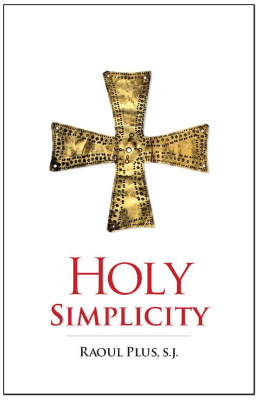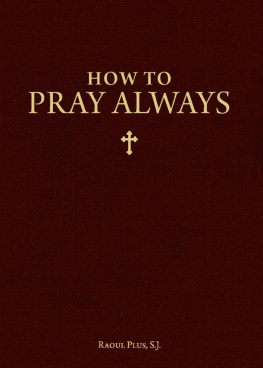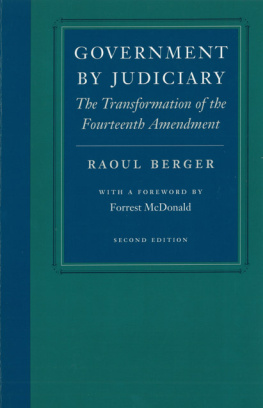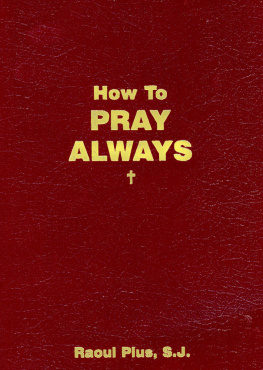Fr. Raoul Plus - Holy Simplicity
Here you can read online Fr. Raoul Plus - Holy Simplicity full text of the book (entire story) in english for free. Download pdf and epub, get meaning, cover and reviews about this ebook. year: 2013, publisher: Sophia Institute Press, genre: Science. Description of the work, (preface) as well as reviews are available. Best literature library LitArk.com created for fans of good reading and offers a wide selection of genres:
Romance novel
Science fiction
Adventure
Detective
Science
History
Home and family
Prose
Art
Politics
Computer
Non-fiction
Religion
Business
Children
Humor
Choose a favorite category and find really read worthwhile books. Enjoy immersion in the world of imagination, feel the emotions of the characters or learn something new for yourself, make an fascinating discovery.
- Book:Holy Simplicity
- Author:
- Publisher:Sophia Institute Press
- Genre:
- Year:2013
- Rating:4 / 5
- Favourites:Add to favourites
- Your mark:
- 80
- 1
- 2
- 3
- 4
- 5
Holy Simplicity: summary, description and annotation
We offer to read an annotation, description, summary or preface (depends on what the author of the book "Holy Simplicity" wrote himself). If you haven't found the necessary information about the book — write in the comments, we will try to find it.
Holy Simplicity — read online for free the complete book (whole text) full work
Below is the text of the book, divided by pages. System saving the place of the last page read, allows you to conveniently read the book "Holy Simplicity" online for free, without having to search again every time where you left off. Put a bookmark, and you can go to the page where you finished reading at any time.
Font size:
Interval:
Bookmark:
Holy Simplicity
Raoul Plus, S.J.
SOPHIA INSTITUTE PRESS
Manchester, New Hampshire
Holy Simplicity was originally published under the title Simplicity by The Newman Press, Westminster, Maryland, in 1951. Chapter 1 from the original edition has been omitted from this 2009 edition by Sophia Institute Press , and minor editorial revisions have been made.
Copyright 2009 Sophia Institute Press
Printed in the United States of America
All rights reserved
Cover design by Theodore Schluenderfritz
Cover photo courtesy of British Museum / Art Resource, New York
No part of this book may be reproduced, stored in a retrieval system, or transmitted in any form, or by any means, electronic, mechanical, photocopying, or otherwise, without the prior written permission of the publisher, except by a reviewer, who may quote brief passages in a review.
Sophia Institute Press
Box 5284, Manchester, NH 03108
1-800-888-9344
www.SophiaInstitute.com
Nihil obstat:
Patricius Morris, S.T.D., L.S.S.,
Censor Deputatus Imprimatur:
E. Morrogh Bernard,
Vicarius Generalis
Westminster, November 15, 1949
[Simplicit. English]
Holy simplicity / Raoul Plus. p. cm.Originally published: Simplicity. Westminster, Md. :
Newman Press, 1951.
Includes bibliographical references.
ISBN 978-1-933184-51-7 (pbk. : alk. paper) 1. Simplicity Religious aspects Christianity. I. Title.
BV4647.S48P55813 2009
241.4 dc222009012169
09 10 11 12 13 14 9 8 7 6 5 4 3 2 1
Other books by Raoul Plus from Sophia Institute Press :
How to Pray Always
Progress in Divine Union
Editors note: The biblical quotations in the following pages are taken from the Douay-Rheims edition of the Old and New Testaments. Where applicable, quotations have been cross-referenced with the differing names and enumeration in the Revised Standard Version, using the following symbol: (RSV =).
Chapter 1

The Simple Soul Focuses on God
To his priests on the mission, St. Vincent de Paul
We must define what simplicity is as a virtue. The term can have two meanings. It may bear a general meaning that is abstract and theoretical, the total absence of duality, of any compounding of elements; or it can be given a more restricted and concrete sense, corresponding rather more closely to the common interpretation. In the first case, we are concerned rather with metaphysics; in the second, the perspective is more psychological.
To make both points of view clearer, we need only ponder in the first case what philosophy and theology tell us of the existence and nature of God; and in the second, what we learn from the habitual behavior of little children. We will consider these two aspects separately for our enlightenment; but we must not be surprised if in practice they become merged together, enriching and completing each other.

God has multiple attributes: goodness, wisdom, knowledge, and so on. It is more accurate to say, not that God has wisdom, goodness, knowledge, but that God is goodness, wisdom, knowledge. All His perfections blend into one unity. In Him as one author expresses it Simplicity is the root of infinity. Therefore, we can understand why Bossuet and St. Vincent de Paul exhort us to meditate on the unique simplicity of God, to help us to practice this virtue of virtues on our own level.
No other virtue, declares St. Vincent de Paul, serves better to draw us close to God. It makes us like unto Him insofar as He is a sole being, one and uncompounded. We must strive to become in virtue what God is in nature. Bossuet, trying to inspire the court circle with disgust for the complications of an intriguing and worldly life, showed them how God held all such things at naught. Our vain pomps and our artificial grandeur cannot arouse the slightest desire in Him whose immensity by its very nature contains everything.
Someone may say: I can understand that God is single, absolute; but at the Creation, did not He Himself establish a duality? Thenceforth there would be God and what He had made.
No. The Creation in no way lessens the perfect simplicity of God. His creatures will not be what they are if the constant support of the Most High does not maintain them in their existence as creatures; lacking that, they must immediately return to nothingness, and the prophet says with truth that in reality they are as naught before Him. The Creation is only the evidence, the proof by His actions of Gods omnipresence and His ineffable immensity.
In bestowing existence, God still sought in all things His own glory; and man, the core of creation, had no other purpose, and still has no other reason for existing save to offer up to the Lord Himself a person who can think and love the homage of all living things. Benedicite omnia opera Domini Domino.
God alone: nothing in the eternal simplicity of God is changed. Not that the creature is God, as Pantheism would have it; but because the created is solely for God in destiny as it is solely from God in its origin.
It was man who was to bring division into the world, disrupting the sacred and simple plan of divine providence. In his disobedience at the beginning of the world, he swerved aside from Gods will, making a god of things created. (How prodigally, alas, he sets up idols for his worship!)
Christ must come and, representing in Himself all mankind, the whole creation, restore to that creation its original vocation to simplicity the focusing of itself solely on God alone. That is the glorious doctrine of the Mystical Body of Christ: we, all, its members, making one only with Him, the Head; we, all, one only with the One in whom the Father is well pleased.
But note this well; the simplicity that would have been effortless if man had remained faithful must henceforth be laborious and doomed to atavistic ills. In man, the Fall has provoked the revolt of his senses against his reason; and around man the revolt of creation against his domination, until then so peacefully assured a tragic duality, and one often changing into violent conflict.
How different were the relations of Adam and Eve with God before and after the Fall! Before, they had no fear of God; afterward, when He called, they hid like children caught in wrongdoing. How different, too, were their relations with each other! Before, each saw in the other nothing but divinely created beauty; afterward, beset by desire, they blushed to see each other naked.
If only Eve had answered the Devils tempting with the cry of simplicity It is forbidden! like a child who is asked, Why will you not do that? and answers, Because Mamma does not wish it, without need for further reasoning or question.
So we understand what is the real essence of simplicity. It exists in God supremely; it existed, still splendid, in man as he came from the hands of God. Through sin, Adam and Eve, for whom until then the Almighty was all, paused upon another object and used it in rebellion. Their outlook was no longer simple; they were less upright of heart. They had compared a creature to their sole Master worse still, they had preferred the creature. That was the tremendous and tragic duality.
I feel two men in me.
Two? Many a legion. Once, the untroubled simplicity of a life completely focused on its true center; now, the chaos and complexity of a life with many centers of attraction.
To be compounded is not in itself an evil; but if a being made up of several elements is to retain beauty and harmony, those elements must be drawn into a unity. It is the same as the various instruments in an orchestra under the conductors baton; or like our two eyes: the fact that we have two eyes does not in any way lessen the simplicity of the visual act, as what each eye records is transmitted by nerves to the same center.
Next pageFont size:
Interval:
Bookmark:
Similar books «Holy Simplicity»
Look at similar books to Holy Simplicity. We have selected literature similar in name and meaning in the hope of providing readers with more options to find new, interesting, not yet read works.
Discussion, reviews of the book Holy Simplicity and just readers' own opinions. Leave your comments, write what you think about the work, its meaning or the main characters. Specify what exactly you liked and what you didn't like, and why you think so.









